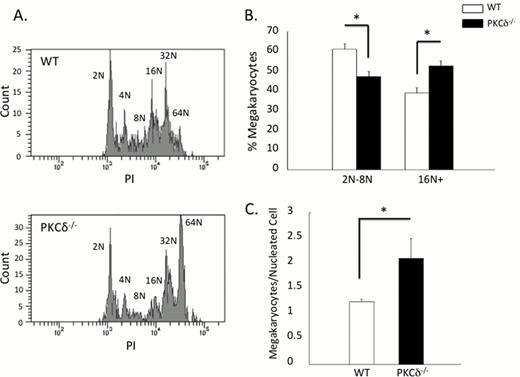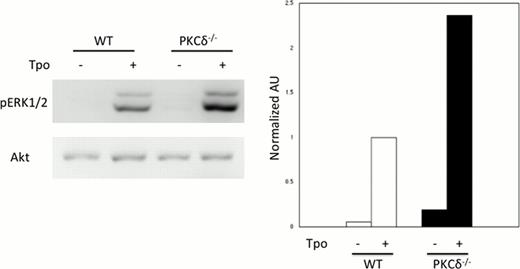Abstract
Abstract 853
Megakaryocytes are large, polyploid cells that give rise to platelets in the bone marrow and spleen. Megakaryocytes achieve their size and DNA content through a process known as endomitosis via signaling from the cytokine thrombopoietin (Tpo). We have previously determined that the novel Protein Kinase C isoforms theta (PKCθ) and delta (PKCδ) regulate a number of platelet functions including aggregation and secretion. However, the function of these two PKC isoforms in primary megakaryopoiesis has not yet been elucidated. Therefore we chose to utilize primary mouse megakaryocytes from WT, PKCδ−/− and PKCθ−/− mice to characterize the roles of PKCδ and PKCq in megakaryopoiesis. We were first able to determine via western blotting that megakaryocytes express more PKCd than either mononuclear bone marrow cells (p < 0.05) or progenitor cells isolated from bone marrow (p < 0.05). Deletion of PKCδ in mice caused an increase in white blood cell and platelet counts compared to WT mice (p < 005). However, deletion of PKCθ had no effect on murine blood cell counts. Observed increases in platelet counts in PKCδ−/− mice are due to increased platelet production as PKCδ−/− mice contain more thiazole orange positive platelets than WT mice (p < 0.05). Furthermore, we determined via flow cytometry that PKCδ−/− mice had more bone marrow megakaryocytes than WT mice (p < 0.05), although megakaryocyte DNA content was unaltered. Conversely, there was no alteration in megakaryocyte number or DNA content with PKCθ deletion. Interestingly, the increase in bone marrow-derived megakaryocyte count observed in PKCδ−/− mice was heightened following culture of bone marrow cells in 50ng/mL exogenous Tpo (Figure 1). Furthermore, in similar experiments, megakaryocyte DNA content was also enhanced in PKCδ−/− mice compared to WT mice (p < 0.05). PKCδ is an important pro-apoptotic protein, and heightened megakaryocyte number following culture could be due to reduced apoptosis in PKCδ−/− megakaryocytes. However, neither apoptosis nor necrosis was altered with PKCδ deletion as the number of AnnexinV+/7AAD- cells, and the number of AnnexinV+/7AAD+ cells, were not different from WT. Therefore, the observed increases in megakaryocyte number and DNA content could be due to elevated Tpo-induced signaling as ERK1/2 phosphorylation was heightened in PKCδ−/− megakaryocytes compared to WT, in response to exogenous Tpo (Figure 2). These data suggest that PKCδ is an important megakaryopoietic protein, which negatively regulates signaling induced by Tpo in megakaryocytes, while PKCθ is dispensable for primary mouse megakaryopoiesis.
No relevant conflicts of interest to declare.
Author notes
Asterisk with author names denotes non-ASH members.



